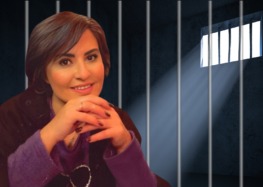The Infirmary
Violations regarding the standards of medical care provided by the prison infirmary were consistent and per- haps the most serious of the abuses reported by the inmates of the Women’s Ward, as such violations have the potential, in the cases of inmates who are severely ill, to ultimately impact the prisoners’ right to life.
The infirmary was uniformly described as filthy and lacking in medical supplies and specialists. Referral to medical specialists outside the prison or to hospital in the case of clearly severe illness was often delayed or denied. The dispensing of critically needed prescriptions was often delayed, and non-specialist physicians in the infirmary at times dispensed the wrong medication.
The UN’s Standard Minimum Rules for the Treatment of Prisoners state, “…Where hospital facilities are provided in an institution, their equipment, furnishings and pharmaceutical supplies shall be proper for the med- ical care and treatment of sick prisoners, and there shall be a staff of suitable trained officers….”
Iran’s State Prison Regulations are also explicit regarding the medical care of prisoners: Article 118 states, “Examination, and when necessary treatment, of sick convicts is the responsibility of the prison or training facility.” Yet the grossly inadequate nature of this “treatment” was described in the following testimonies.
According to one prisoner’s testimony:
Sanitary and health conditions are a disaster. The infirmary has dispensed wrong medications with total impunity. Transfers for medical treatment have been canceled. [Prisoner name withheld 20]… staged a sit-in in front of the head of the infirmary for two or three weeks until her request to see a dentist was finally approved seven or eight months later [this prisoner was recently released from the Women’s Ward]. The infirmary is an extremely filthy area without any pharmaceutical or treatment facilities. There’s no specialist physician.
The average age [of the prisoners in Evin’s Women’s Ward] is more than 40 and every person is suffering from some sort of illness because of the years in prison. There’s no justi cation for their present condition. It only shows that they are being treated too harshly.
Sometimes in addition to giving the wrong medication to [prisoner name withheld], they did the same to [the names of two prisoners withheld].
There are prisoners in the Women’s Ward who have been there for eight years or so, without the right to leave on furlough for even a minute, and as a result have developed all sorts medical issues. Digestion, bone and skin diseases are among the most common in this ward.
The female political and ideological inmates are the only women kept at Evin and therefore a target for additional abuse. These women can visit the in rmary and receive emergency medical care only with permission from the prison authorities. Also a security of cer is always present when a female inmate goes to the in rmary. Visits to the in rmary by female inmates is possible only at a certain time of the day. If they need medical attention after that time, they have to wait until the next day, unless it’s an emergency.
Evin’s in rmary has one general practitioner and a few basic pharmaceuticals. The pharmacy is closed on Thursdays and Fridays and therefore anything prescribed by doctors cannot be obtained on those days. Since the beginning of the year (March 21, 2015), the in rmary has often dispensed the wrong medication to patients, sometimes causing dangerous complications. Prisoners have complained about this but it still goes on.
Those prisoners who need to get prescription drugs from outside prison with the help of their families must wait to get permission from the head of the infirmary who accepts visitors once a week. For those who run the prison or the judicial officials, it’s not important how urgently the prisoners may need certain medications or treatments. The process for transferring patients to outside medical facilities can take nine months to a year, depending on how critical their condition is. Even then the officials often break their promises or cause delays.
The violations of Iran’s Prison Procedures reflected in the above testimony are severe and numerous. Article 103 states, “…when necessary, the convict’s transfer for treatment must be confirmed by the prison infirmary and permitted…. In emergencies, the sick convict will be transferred to a hospital….” Article 111 states, “the prisoner must be given the required medical tests, and proper steps should be taken to either treat him or transfer him to [a better equipped] hospital.” Article 112 states, “If the prisoner’s life depends on [a prescription] drug, it must be given to him immediately after the doctor examines and prescribes the drug for him.” And Article 113 states, “The prisoner should in- form the guard as soon as he feels ill. After acquiring a permit, the prisoner must be sent to the infirmary of the penal institution or prison in order to receive the needed drugs and medical instructions.”
This testimony, which refers to the experiences of multiple prisoners, also reflects violations of the UN’s Standard Minimum Rules for the Treatment of Prisoners. These standards, which all UN Member States are expected to abide by, state the following: “…Sick prisoners who require specialist treatment shall be transferred to specialized institutions or to civil hospitals.”
This standard is also cited in the United Nations Basic Principles for the Treatment of Prisoners, which stipulates: “Prisoners shall have access to the health services available in the country without discrimination on the grounds of their legal situation.”
A former prisoner reported a similarly dismal picture of the prison’s infirmary:
They wouldn’t allow us [access to] treatment and transfer to the infirmary, and because of Sharia- related issues, we were denied even the scant facilities of the infirmary. If someone felt poorly inside the ward, under no circumstances would a doctor come to visit her, and because there were no stretchers or wheelchairs, other prisoners would have to carry the sick inmate to the ambulance. They never kept any female prisoners inside the Evin infirmary for further observation. Because they did not have female staff, for Sharia-based reasons, they did not perform injections and electrocardiograms (ECG) for women.
[The infirmary] did not have any female nurses. There were only female administrative staff of the infirmary, one of whom knew how to do injections and take ECGs. She would give shots to those who needed it during office hours. But myself and [patient name withheld], who had chest pains at night and an irregular heartbeat were not given the needed ECGs due to the absence of female staff and Sharia-based issues. There was also a female OB/GYN specialist who only came to the prison infirmary for visits once a month.
After the issue of [denied] access to telephones, the issue of the infirmary was [the most important to inmates] …in addition to the lack of treatment and the absence of female staffers, [the infirmary] also repeatedly dispensed the wrong medication, and put the inmates’ lives at risk. The infirmary would make mistakes in sending meds to inmates who had to take them every night. They won’t allow a sick inmate to keep her own medication, and the infirmary throws all the medications and pills of each sick person without a [marking] cover into a box and the meds were often dispensed incorrectly. The inmates tried to determine their medications through the color, size, and shape of their pills, and this is how they knew that they had been given the wrong pills. The medicines the families provided would get lost in the infirmary, or they would dispense them to inmates from other wards.
According to another former prisoner who is still in close touch with the current inmates,
One of the biggest problems with the Women’s Ward is that it has a paltry infirmary to which prisoners are transferred no matter what ailments they have. Its physicians are either no good, or they don’t have the tools they need for proper examination, tests, and treatment. But they don’t allow you to be transferred to a hospital or a doctor’s office outside the prison. There is no trust. For example, I had a dental problem, but I didn’t want them to work on my teeth at the prison infirmary. I didn’t believe it was hygienic in the infirmary.
A former prisoner released two years ago confirmed the long-standing nature of the problems with the Women’s Ward infirmary:
When a prisoner got sick, she was sent to the prison infirmary, but more often than not, there was a shortage of specialists. It would take a long time before we could be seen by a specialist. In the case of [prisoner name withheld] who was severely ill, her family bought her medicine from outside sources, but it would take weeks before they would reach her.
The above testimonies corroborate the violations of Iran’s State Prison Procedures Articles 103 and 111 requiring the transfer of ill inmates to hospital, and the UN’s Standard Minimum Rules for the Treatment of Prisoners.
Iran’s State Prison Procedures state in Article 120 that “The head of prison’s infirmary is required to … [ensure] that they receive adequate care from doctors and nurses, [and] he must supervise the patients’ proper diet and recovery completely and continually.” Yet adequate care is not being delivered, nor is their recovery allowed.
As a result, multiple prisoners have suffered grave deterioration in their health, and, for some, permanent damage. For example, Bahareh Hedayat faces possibly irreversible reproductive system damage due to chronic and improperly treated conditions that may prevent this 34-year-old woman from bearing children. The 43-year-old Narges Mohammadi, who has young children, has been denied proper treatment for worsening neurological problems that cause muscular paralysis, and has suffered seizures during her imprisonment. Atena Faraghdani, age 29, who has just recently been released, had developed signs of lymphatic disease during her imprisonment in the ward. Another prisoner who was recently released from Evin’s Women’s Ward, 27-year-old Atena Daemi, was diagnosed with symptoms of multiple sclerosis, but was unable to receive specialized treatment for over eight months while she was in the ward.


